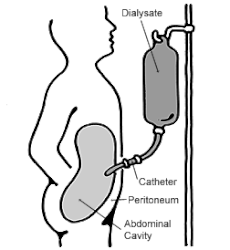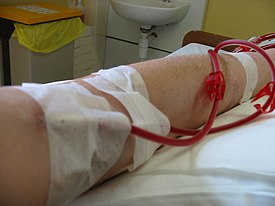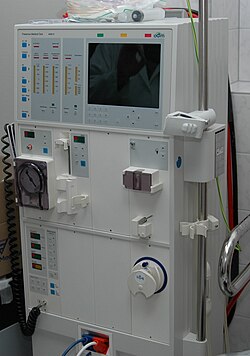My dad was the rock of this family. He had a family, a career, great friends, hobbies he didn’t have a care in the world. He was loving life, until the day his whole life changed. That day would be 8/31/1989 when my dad had a mini stroke. With that stroke and many tests later the final diagnosis was:
Malignant hypertension
Bilateral small intracerebral infarcts
Renal Failure
Bilateral small polycystic kidneys
That was a whole lot of seriousness going on. The stroke really didn’t cause any physical damage but the damage was already done inside. All these problems were most likely brought on my cronic hypertension. Dad never went to the doctor. They call high blood pressure the silent killer as it rarely causes any symptoms until it is too late. This was the start of 5 years in and out of hospitals for various problems.
Since he now had kidney failure he needed dialysis. Back then they started with peritoneal dialysis. This was a dialysis he could do at home.
| Peritoneal dialysis | |
|---|---|
| Intervention | |
 Schematic diagram of peritoneal dialysis |
|
| Peritoneal dialysis (PD) is a treatment for patients with severe chronic kidney disease. The process uses the patient’s peritoneum in the abdomen as a membrane across which fluids and dissolved substances (electrolytes, urea, glucose, albumin and other small molecules) are exchanged from the blood. Fluid is introduced through a permanent tube in the abdomen and flushed out either every night while the patient sleeps (automatic peritoneal dialysis) or via regular exchanges throughout the day (continuous ambulatory peritoneal dialysis). PD is used as an alternative to hemodialysis though it is far less commonly used in many countries, such as the United States. It has comparable risks but is significantly less costly in most parts of the world, with the primary advantage being the ability to undertake treatment without visiting a medical facility. The primary complication of PD is infection due to the presence of a permanent tube in the abdomen. | |
I believe he had to do this every 3-4 days. He was only able to this type of dialysis until 5/20/90 when his intestine ruptured and he needed emergency surgery. Now the only option was hemodialysis.
In medicine, hemodialysis (also haemodialysis) is a method that is used to achieve the extracorporeal removal of waste products such as creatinine and urea and free water from the blood when the kidneys are in a state of renal failure. Hemodialysis is one of three renal replacement therapies (the other two being renal transplant and peritoneal dialysis). An alternative method for extracorporal separation of blood components such as plasma or cells is apheresis.
Hemodialysis can be an outpatient or inpatient therapy. Routine hemodialysis is conducted in a dialysis outpatient facility, either a purpose built room in a hospital or a dedicated, stand alone clinic. Less frequently hemodialysis is done at home. Dialysis treatments in a clinic are initiated and managed by specialized staff made up of nurses and technicians; dialysis treatments at home can be self initiated and managed or done jointly with the assistance of a trained helper who is usually a family member.
Dad started out on hemodialysis at Waupun Dialysis Clinic twice a week, as time went by he went to every other day. He would spend 4 hours sitting in a chair getting his blood cleaned. My mom, grandpa and grandpa would take turns driving and hanging out with dad at the clinic. The nurses loved him there as he has such a great sense of humor he was the life of the party on his dialysis days.
I don’t know how he did it but he managed to continue to work, thankfully he had a boss that understood his condition and didn’t let that get in the way of his job. He continued to do the hobbies he loved to do except he did have to retire from the Fire Department. He was on dialysis for 4 years, during this time my mom and grandma got screened to be live donors. My mom found out she had type 2 adult onset diabetes so they wouldn’t accept her. My grandma found out she was borderline diabetic so she couldn’t donate either. This crushed my grandma the most. She pleated with the doctors to let her donate and they wouldn’t budge. She told them that she lived her life and if something happened after the procedure she was ok with that as she had lived her life and she was ok with dying. Anything to let her son live a somewhat normal life. The answer was still no. I also tried to donate but I was only 20 at the time and the doctor said he wouldn’t accept me as I didn’t have children yet and having one kidney is stressful on the body so he didn’t want to take my kidney til after I had kids. If he only knew way back then that I really knew what I was talking about and I didn’t want children. I still don’t have any children and don’t plan on starting now so if he would of only listened to me. That is one of my biggest regrets.
On my dad’s bucket list was to be able to go to Las Vegas. In order for this to happen my mom had to find a clinic near where they were staying and set up his dialysis days. This was easily done and the trip was booked. My mom and dad went on their first trip out of the state since their honeymoon. My dad’s cousin Dick and his wife Sharon went with them. The toured Hoover dam, walked the strip and took in the sites. Little did they know it would be his last trip.
Since I couldn’t donate one of my kidney’s to my dad I did sign my drivers license and registered with the state of Wisconsin for organ donation. I also am on the National Bone Marrow registry. I also give blood when I can. I might not of been able to help my dad but hopefully I will be able to help someone else out one day. I think everyone should be a part of organ donation as you can make a family in need very happy.
“Don’t take your organs to heaven, heaven knows we need them here”
Yes I will Wisconsin Organ Donation Registry
Wisconsin Organ & Tissue Donation Program
Be The Match National Bone Marrow Registry
Becoming A Organ And Tissue Donor Department of Transportation WI




